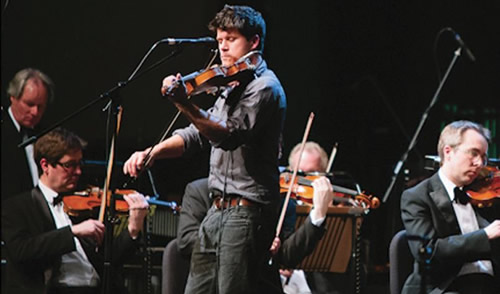When we caught up with folk superstar, Seth Lakeman, just before Christmas he was on a bracing walk around Dartmoor with George, his spaniel. After making soppy noises over the dog, FFS calmed down enough to ask Lakeman about his recent collaboration with the BBC Concert Orchestra and how he plans to top the success of last year’s ‘Tales From the Barrel House’.
You recently released a recording of a performance with the BBC Orchestra which saw a reworking of some of your most popular tracks – ‘Blacksmith’s Prayer’, ‘Lady of the Sea’, ‘Changes’, ‘King and Country’ and ‘Kitty Jay’. How did this come about?
I was approached by the BBC and they explained to me they were looking to interpret other people’s songs with the BBC Concert Orchestra in mind. I was quite flattered and said I’d love to and so they put me in touch with Anne Dudley, which was even better again, and Anne was in charge of arranging the songs. I didn’t necessarily choose them myself, I think they were chosen out of the catalogue I’ve got – I guess they would probably call them a ‘Greatest Hits’. But yeah, it was quite an incredible experience. We only really had one, hour long performance at their Watford HQ and then that was it – just straight into the performance and the recording of the live show itself. So we were up against it!
It sounds like it! Do you think you would have chosen any of the songs that were selected yourself?
Yes and no…there’s some I would’ve chosen but, when you’re working with an orchestra – I now understand that they’re quite delayed. And one thing I tend to do with the music I’m writing is, I’m on top of the beat, so it was a push-pull… I had to slow down things like ‘Kitty Jay’. It definitely had the drama and the arrangements were fabulous but in terms of drive and rhythm – it’s lost.
It seems that some of the ‘chosen’ songs worked so well originally because of their honesty and lack of embellishment – was it a risk having them highly orchestrated?
Yeah, I think there’s always a risk with songs like that – you’re so exposed, you’re literally just a voice and them, and they’ve come from such an unusual way of recording so they’ve grown organically… I think they’re [the new arrangements] all fabulous but it’s more the ones with a journey that seem to have come out that much stronger – ‘Changes’, ‘King and Country’…
In terms of the actual recording process – it must have been a huge contrast to recording down a mine, as you did on Barrel House, for example?
It’s been a year a half of two extremes of recording – from live, epic sound to this sort of focused, back-to-basics recording process.
Do you think you’ll go back to your more stripped-down methods, or has this given you an appetite for more elaborate set- ups?
I think it was just another experiment really – it was a great angle to show these songs from and I felt highly privileged to work that day with Anne and the orchestra. There’s been talk of doing another concert with them in Watford so that could happen because it did seem very successful and people were really happy with it. But in terms of recording again like that – quite unlikely. And in terms of recording the Barrel House – quite unlikely again, cos’ it was part of that moment.
Are you writing at the moment?
Yeah, I’m working a lot actually. I’m going around interviewing people for an idea I’ve been working on for about 2-3 months – Word of Mouth is the working title. I’m trying to draw out and unravel some of those stories people have got to tell, just trying expose those events and those characters. I’m finding it fascinating.
Are you continuing to work with tales from the West Country?
It’s got to be what you know. In terms of exploring outside the boundaries of the West Country, I guess I could, but I’d have to be able to travel and go and explore and get on a bit of a road trip, so it’s tougher to do that. I guess there’s got to be a way of keeping it in some sort of focus and maybe regional is one of those, because to be honest the stories could be from anywhere, they’re quite universal.
How does the landscape and environment of the Dartmoor area affect what you write?
I was chatting to someone else about that this week, and they were saying that they felt diverted and distracted when working in a city, so certainly you get the escapism and the space and the feeling of being able to concentrate. That’s important when it comes to song writing cos’ its quite a lonely process. It’s helps to be in a place like this, Dartmoor, and also I think it’s the people – they’re timeless, in a way, it is like stepping back in time. So I feel that within the music I’m creating, it fits incredibly well and ties together. There’s always something going on in a city, which is great, but I think it’d take a long time for me to get a record together!
What have you got lined up for next year?
There’s a lot going on actually. There’s a tour of Germany going on at the end of January, and then we’re going to Australia for a month in March and then May we’re doing the Hay Festival. Then it’s back and trying to make a record in summer time. Then – who knows?

